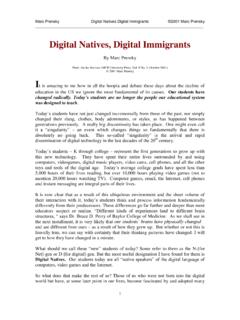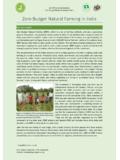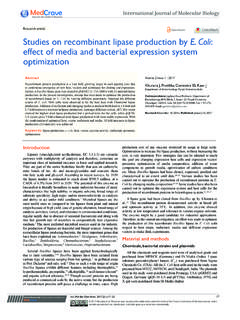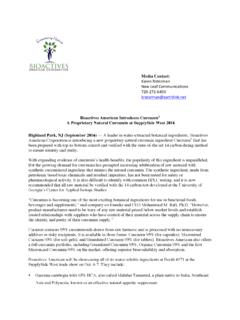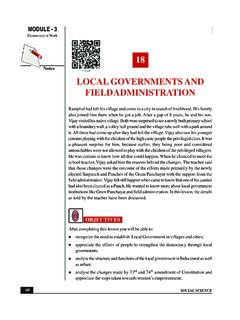Transcription of About the Institute A Systematic Review - ISID
1 Institute for Studies in Industrial Development4, Institutional Area Phase II, Vasant Kunj, New Delhi - 110 070 Phone: +91 11 2676 4600 / 2689 1111; Fax: +91 11 2612 2448E-mail: Website: for Studies in Industrial DevelopmentNew Delhi179 Working PaperMarch 2015 Swadhin Mondal& Dinesh AbrolCLINICAL TRIALS INDUSTRY in india :A Systematic ReviewAbout the InstituteThe Institute for Studies in Industrial Development (ISID), successor to the Corporate Studies Group (CSG), is a national-level policy research organization in the public domain and is affiliated to the Indian Council of Social Science Research (ICSSR). Developing on the initial strength of studying india s industrial regulations, ISID has gained varied expertise in the analysis of the issues thrown up by the changing policy environment.
2 The Institute s research and academic activities are organized under the following broad thematic areas:Industrialization: Land acquisition, special economic zones, encroachment of agricultural land, manufacturing sector, changing organized-unorganised sector relationship, rise of service economy in india , training and skill formation etc.; Corporate Sector: With special emphasis on liberalization-induced changes in the structures of the sector, corporate governance, individual firms/groups, emerging patterns of internationalization, and of business-state interaction;Trade, Investment and Technology: Trends and patterns of cross-border capital flows of goods and services, mergers & acquisitions, inward and outward FDI etc.
3 And their implications for india s position in the international division of labour; Regulatory Mechanism: Study of regulatory authorities in the light of india s own and international experience, competition issues;Employment: Trends and patterns in employment growth, non-farm employment, distributional issues, problems of migrant labour and the changes in workforce induced by economic and technological changes;Public Health: Issues relating to healthcare financing, structure of health expenditure across states, corporatisation of health services, pharmaceutical industry, occupational health, environment, health communication;Media Studies: Use of modern multimedia techniques for effective, wider and focused dissemination of social science research to promote public debates;Other Issues: Educational policy and planning, role of civil societies in development processes has developed databases on various aspects of the Indian economy, particularly concerning industry and the corporate sector.
4 It has created On-line Indexes of 210 Indian Social Science Journals (OLI) and 18 daily English Newspapers. More than one million scanned images of Press Clippings on diverse social science subjects are available online to scholars and researchers. These databases have been widely acclaimed as valuable sources of information for researchers studying india s socio-economic development. CLINICAL TRIALS INDUSTRY in india : A Systematic Review Swadhin Mondal Dinesh Abrol Institute for Studies in Industrial Development 4, Institutional Area, Vasant Kunj Phase II, New Delhi 110 070 Phone: +91 11 2676 4600 / 2689 1111; Fax: +91 11 2612 2448 E mail: Website: March 2015 ISID Working Paper 179 Institute for Studies in Industrial Development, 2015 ISID Working Papers are meant to disseminate the tentative results and findings obtained from the ongoing research activities at the Institute and to attract comments and suggestions which may kindly be addressed to the author(s).
5 CONTENTS Abstract 1 1. Introduction 1 2. Materials and Methods 3 3. Results 3 Why and How india became a Favourable Destination for Clinical Trials? 3 Effect of Foreign Investment in Clinical Trials on the Indian Pharmaceutical Industry 7 Clinical Trials and Technological Spill over Effect on the Indian Pharmaceutical Industry 9 Legal and Ethical Issues in Recent Clinical Research 12 Government Regulation on CTs 14 4. Discussion 16 5. Conclusions 19 References 20 List of Figure(s) Figure 1 Global Share of CTs by Country 4 Figure 2 Relative Position of the Country in terms of Patient Pool and Regulatory Conditions 5 Figure 3 Relative Position of the Countries in terms of Patient Pool and Cost efficiency 6 Figure 4 R&D Expenditure in Pharmaceuticals 8 Figure 5 Clinical Trials Study in india by Type of Trials 9 Figure 6 Percentage of New Clinical Studies Registered by Phase 10 Figure 7 Disease wise Clinical Trials Study in india 11 List of Table(s) Table 1 Availability of Relevant Skilled Professionals 6 Table 2 Analysis of Pharmaceutical FDI.
6 Number of Projects by Activity 8 Table 3 Health Conditions and Disability Adjusted Life Years Lost in india 11 Table 4 Number of Deaths, Injuries and Compensation Received by the Kin 13 Table A1 Disease Type wise Product R&D Activities of Domestic Firms Active in india , 1999 2009 22 CLINICAL TRIALS INDUSTRY in india : A Systematic Review Swadhin Mondal & Dinesh Abrol [Abstract: This study shows that many global clinical trials organisations have relocated their clinical trial (CT) research units to india . The Indian CT industry has become one of the most cost efficient destinations in the world. It is growing fast and has emerged as a popular destination for global clinical trials. However, the process followed by the pharmaceutical companies for conducting CTs has raised some critical issues.]
7 First of all, the Indian CT industry has not been able to ensure rapid technological transformation and the building of capabilities required for development of new drugs despite receiving help from the internationally acclaimed CROs in india . Although the CT industry has been able to take advantage of financial gain from the global clinical trial activities conducted in india , capability building for development of new drug is not occurring in a manner that can help the country tackle public health challenges. Second, over the past few years, the CT industry has come to face regulatory challenges. It is confronted with some serious ethical issues on account of its conduct with regard to containing deaths. Between 2010 and 2012, around 2500 people died because of adverse effects of drugs under trial.
8 But, only a few participants received compensation in case of injury sustained or death. The authors of this paper argue that the Government of india needs to establish a policy framework for the Indian CT industry to provide for easy access to affordable drugs developed through adaptive clinical trials and create a regulatory environment capable of ensuring the conduct of clinical trials without violation of humanitarian ethics and other social norms.] Keywords: Economics, Clinical Research, Ethics, Regulation, india JEL Classification: I18 Government Policy, Regulation, Public Health 1. Introduction In 2005, india became fully compliant to TRIPS. Since then the policymakers have been trying to make changes in the policy framework and regulatory environment in order to promote clinical trials in india .
9 These changes are known to have encouraged the international Clinical Research Organisations (CROs) to expand their clinical research The author is an Assistant Professor at ISID, New Delhi. The author is a Professor at ISID, New Delhi. 2 programmes in india . india hosts nearly a fifth of all global clinical trials with a huge potential for financial and scientific gains (The Lancet, 2007; Bavdekar, 2008). CROs are taking advantage of getting large pool of patients, highly skilled medical investigators, lower drug development costs and timely completion of clinical trials in india (Kaur, 2006; Bhat, 2004; Singh, 2008). Recently, pharmaceutical companies that are involved in clinical trials are being trailed by a growing concern over the clinical research ethics followed in india .
10 Global pharmaceutical companies are outsourcing their projects to india for several reasons: enhancing profit, cutting the cost of drug development and speeding regulatory approval, and, fostering a less hostile environment among the world s impoverished ill. Clinical trials are more than 50 per cent cheaper in india compared to developed countries (Jayaraman, 2004; Singh. 2008; Bigoniya et al., 2010; Bajpai, 2013). The reasons for low cost of drug development are cheap human resource, low recruitment cost and lower rate of compensation for any injury sustained or death during the research process. In fact, CROs even recruit patients without any formal assurance of compensation because a large proportion of participants in india are illiterate and lured into trials by offers of free healthcare and financial inducements.


